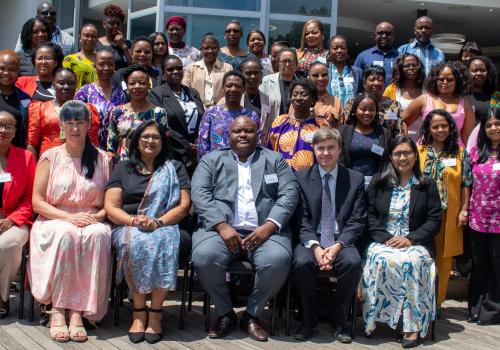The Secretariat of the Southern African Development Community (SADC) in partnership with the African Centre for the Constructive Resolution of Disputes (ACCORD) and UN Women convened a workshop from the 29th of November to the 1st of December 2023 in Johannesburg, South Africa where the Guidelines to operationalize the network of women mediators in Southern Africa were validated. Thirteen SADC Member States with representation from Ministries of Gender; Ministries of Politics & Defence; coordinating bodies of NGOs and other civil society organisations attended the workshop. The workshop also identified concrete and practical opportunities for improved coordination, collaboration and harmonization of mediation efforts between national networks and the SADC Secretariat. The validated Guidelines will be presented to the relevant Ministerial Committees, and subsequently, to the Ministerial Committee of the Organ (MCO) on Politics, Defence and Security Cooperation for final approval.
The workshop kicked off with an opening session graced by the UN Women Representative in the Republic of South Africa, Ms. Aleta Miller; ACCORD’s Advisor on Women, Peace and Security, Mrs. Pravina Makan-Lakha, Mr. Tim Reilly, of the Embassy of Ireland and SADC’s Senior officer for Politics and Diplomacy, Mr. Terry Rose.
In his opening remarks Mr. Terry Rose the Senior officer for Politics and Diplomacy at the SADC Secretariat presented the background of the process from the adoption of the United Nations Security Council Resolution (UNSCR) 1325 to the establishment of the network of Women Mediators in Southern Africa at SADC level, which was endorsed by Ministries responsible for Gender and Women's Affairs and approved by the MCO in June and July 2023 respectively up to the development of the guidelines. He explained the parameters of the network and its interaction with other SADC structures such as the Panel of Elders (PoE) and the Mediation Reference group (MRG).
The UN Women Representative in the Republic of South Africa, Ms. Aleta Miller noted that peace was more sustainable when women are involved, and highlighted that the concept of social peace which promotes social cohesion in communities, was more important than political peace which focuses on peace accords.
Mrs. Pravina Makan-Lakha, ACCORD’s Advisor on Women, Peace, and Security, said that the exclusion of women in peace processes a risk creating temporary and fragile peace. She emphasised that the involvement of women in mediation was important because internal conflicts were increasing and women were affected differently from men.

